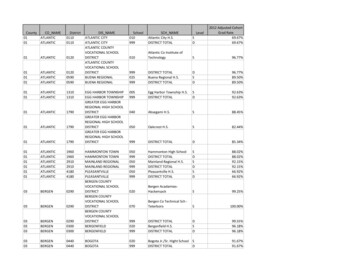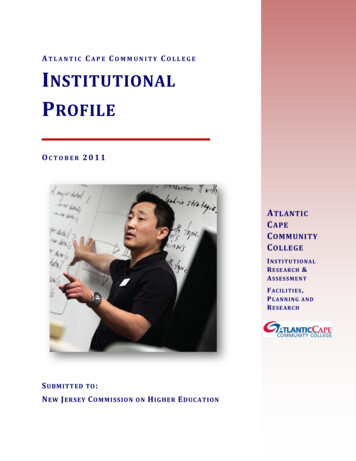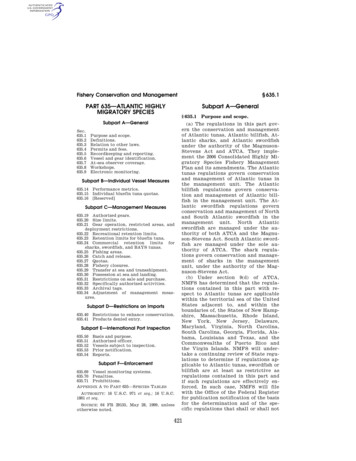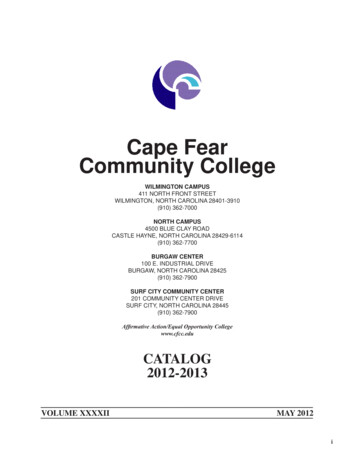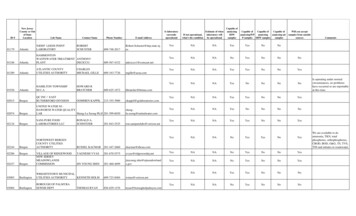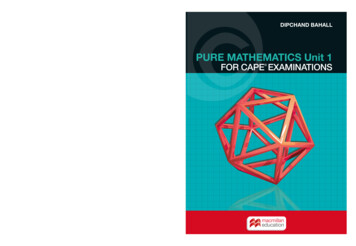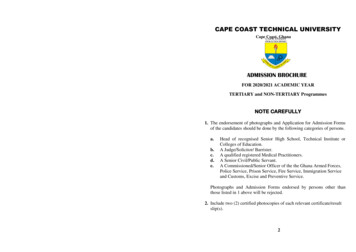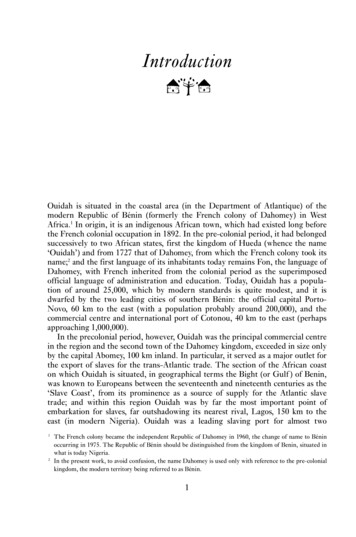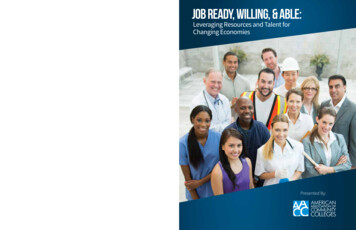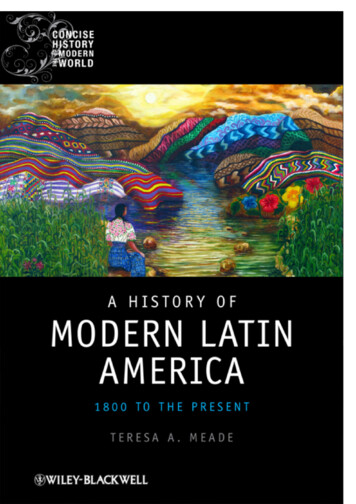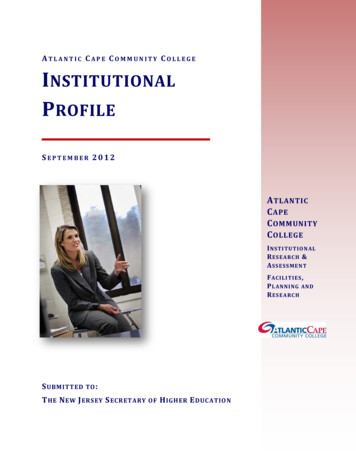
Transcription
ATLANTIC CAPE COMMUNITY COLLEGEINSTITUTIONALPROFILESEPTEMBER 2012A TLANTICC APEC OMMUNITYC OLLEGEI N S TI T U TI O N ALR E S E AR CH &ASSESSMENTF A CI L I TI E S ,P L AN N I N G AN DR E S E AR CHS UBMITTEDTO :T HE N EW J ERSEY S ECRETARYOFH IGHER E DUCATION
ATLANTIC CAPE COMMUNITY COLLEGE: PREFACEATLANTIC CAPE COMMUNITY COLLEGEPREFACEOVERVIEWAtlantic Cape Community College is a comprehensive, student-centered institution of highereducation that prepares students to live and work in the 21st Century – an increasingly culturallydiverse society, where technology is used in all areas of life and where modern communications hasmade us all citizens of the world. Accordingly, we offer the residents of Atlantic and Cape Maycounties, and others, associate degrees, liberal arts transfer programs, certificate programs and awide range of technical training and courses for professional and personal growth. We provideaccess to these courses and programs by maintaining a moderate tuition rate, pursuing openadmissions and affirmative action policies, and offering developmental programs and other supportservices. We respond to the economic, social, academic, cultural, and workforce needs of a diverseconstituency by working in partnership with other schools, business and industry, and government.Atlantic Cape Community College and its employees serve the community by providing educationaland support services that encourage students to pursue academic excellence, professional growth,and high ethical standards throughout their lives.MISSION STATEMENT Atlantic Cape Community College creates opportunity by providing access to superioreducational programs.i
ATLANTIC CAPE COMMUNITY COLLEGE: PREFACEI N S TI TU T I O N A L H I S T O R YIn 1947, the President’s Commission of Higher Education brought the concept of thecommunity-centered school into reality. The community college movement gained momentumthroughout the United States during the 1950s as the student population accelerated its growth inthe years following World War II.In Atlantic County, various groups urged that a college be established in this area with thegoals of providing an educational service to the entire community and discovering and developingindividual talents at low cost with easy access. The Citizens’ Centennial Committee on AdultEducation for Atlantic City was instrumental in stimulating interest in a local college. The efforts ofsuch groups, combined with those of educators, legislators and individuals, resulted in the passageof the New Jersey County College Act, which established county colleges in 1962.Following the passage of the New Jersey County College Act, a special committee of CountyFreeholders and educators prepared a study that showed the need for such an institution inAtlantic County. In December 1963, the New Jersey Department of Education granted approval forthe establishment of Atlantic Community College which became the second community college tobe organized by the state on April 14, 1964.The site for the college was selected on November 19, 1964, and official ground-breakingceremonies for its nine-building complex in Mays Landing were held in November 1966. AtlanticCommunity College opened its doors to students in September 1966 using facilities rented fromAtlantic City High School. In February 1968, the college moved to its present campus on the BlackHorse Pike (U.S. Route 322) in Mays Landing. In the spring of 1982, major work was completed on atwo-year, 7 million expansion project. This project included two new buildings, expanded studentservice facilities, the Academy of Culinary Arts and additional classroom and office space.In that same year, the former Atlantic City Electric Company building, located in AtlanticCity, was purchased by Atlantic County for the college. By 1984, a 4 million renovation projecttransformed the aging building into a beautiful modern facility housing the Casino Career Institute(CCI). CCI was the country’s first gaming school affiliated with an institution of higher education. Asecond major renovation was completed in 2008. This renovation houses the Health ProfessionsInstitute in 9,000 square feet of previously underutilized space. The College’s Atlantic City Campuswas renamed in memory of Atlantic County’s first county executive, Charles D. Worthington, inApril 2001. Mr. Worthington was involved with the College, first as chairperson of its EducationalOpportunity Fund Advisory Board and then as Atlantic County Executive in supporting theestablishment of many college programs and the development of the Atlantic City Campus.The William J. Spangler Library on the Mays Landing campus was expanded and renovatedin 1990, adding a mezzanine level, a computer lab with space for more than 90 personal computers,faculty and administrative offices, small study/meeting rooms, a classroom/meeting room andtyping, video and audio tape rooms.The Academy of Culinary Arts expanded facility, which opened in October 1991, featuresmore than 28,250 square feet of space. The entrance opens to an atrium lobby. The buildingii
ATLANTIC CAPE COMMUNITY COLLEGE: PREFACEprovides teaching kitchens, classrooms, a 90-seat gourmet restaurant, service and storage areas,and administrative and faculty offices.Since 1973, the college has been the main provider of community college education to CapeMay County residents. For many years, Cape May County officials studied ways to bring betterhigher educational opportunities to its residents.In July 1995, the New Jersey Commission on Higher Education declined Cape May County’srequest for an independent college and recommended that it enter into a partnership with aneighboring community college, citing such benefits of a joint college as a larger population base,economies of scale, immediate availability and accreditation of curricula, and elimination ofduplication of efforts and costs.Cape May County requested jointure proposals in February 1997. As a result, on January 1,1999, Atlantic Community College officially became a joint college encompassing Atlantic and CapeMay counties. The Board of Trustees approved a new name for the joint college: Atlantic CapeCommunity College (Atlantic Cape) in February 1999. The Cape May County Campus (CMCC)opened in August 2005. The 68,000-square-foot facility features a brick façade and two wings thathouse an information commons that includes a combination library and computer lab; a 100-seatlecture hall; a cafeteria; and 19 classrooms—including chemistry and biology labs, three academiccomputer labs, two continuing education computer labs and one distance education classroom. Inaddition, Atlantic Cape provides support services facilities, including counseling, testing, tutoringand financial aid offices as well as administrative offices at CMCC.Dr. Peter L. MoraPresidentiii
ATLANTIC CAPE COMMUNITY COLLEGE: TABLE OF CONTENTSI.T ABLEOFC ONTENTSPreface. iOverview . iMission Statement . iInstitutional History .iiI. Table of Contents .1II. Data by Category .3A . Ac c r e di ta t io n Sta tus .3Institutional Accreditation .3Professional Accreditation and Certifications .3B. Number of Students Served .41. Enrollment by Attendance Status .42. Non-Credit Enrollment .43. Unduplicated Enrollment .4C. Characteristics of Undergraduate Students .51. Enrollment in Remediation .52. Race/Ethnicity, Sex, & Age .63. Number of Students Receiving Financial Assistance .74. Percent of Students Who Are New Jersey Residents .7D. Student Outcomes .81. Graduation & Transfer Rates .82. First Time Students Retention Rates .8E. Faculty Characteristics .91. Full-Time Faculty By Race/Ethnicity, Sex, and Tenure Status.92. Percentage of Course Sections Taught by Full-Time Faculty . 103. Ratio of Full-to Part-Time Faculty . 10F. Characteristics of the Trustees . 111. Race/Ethnicity & Sex . 112. List of Trustees with Titles and Affiliations . 123. URLs of Web Pages with Information on Trustees . 16G. Profile of the Institution . 171. Degree & Certificate Programs . 172. Other . 26H. Major Research and Public Service Activities . 281. Research and Development Expenditures . 282. Research. 283. Public Service Activities . 29I. Major Capital Projects . 301
ATLANTIC CAPE COMMUNITY COLLEGE: TABLE OF CONTENTS2List of TablesTable II.B.1. Credit Enrollment . 4Table II.B.3. Unduplicated Enrollment. 4Table II.C.1.a. Enrollment. 5Table II.C.1.b. First-Time, Full-Time Students Enrolled in Remediation . 5Table II.C.1.c. First-Time, Full-Time Students in Remediation by Subject Area . 5Table II.C.2.a. Enrollment by Race/Ethnicity . 6Table II.C.2.b. Enrollment by Gender . 6Table II.C.2.c. Enrollment by Age . 6Table II.C.3. Financial Aid from State Funded Programs . 7Table II.C.4. First-Time Full-Time by State Residence . 7Table II.D.1.a. Two Year Graduation Rate. 8Table II.D.1.b. Three Year Graduation & Transfer Rates . 8Table II.D.2.c. Fall-to-Fall Retention. 8Table II.E.1. Full-Time Faculty by Race/Ethnicity, Sex & Tenure . 9Table II.E.2. Percentage of Course Sections Taught by Full-Time Faculty . 10Table II.E.3. Ratio of Full-to Part-Time Faculty .10Table II.F.1. Trustees Race/Ethnicity/Sex.11Table II.H.1. R&D Expenditures .28I N S T I T U T I O N A L P R O F I L E 20 1 2
A T L A N T I C C A P E C O M M U N I T Y C O L L E G E : II .II.D ATABYDATA BY CATEGORY3C ATEGORYA. ACCREDITATION STATUSI N S TI TU T I O N A L A C C R E D I T A T I O NAtlantic Cape Community College (Atlantic Cape) is accredited by the Middle StatesAssociation of Colleges and Schools, Commission on Higher Education. The Middle StatesAssociation of Colleges and Schools is a regional institution accrediting body recognized by the U.S.Department of Education. MSCHE visited Atlantic Cape in 2006 and full accreditation wasreaffirmed in March 2008. A five-year periodic review will take place in 2013.P R O F E S S I O N A L A C C R E D I T A T I O N A N D C E R T I F I C A TI O N SThe Associate in Applied Science degree program in Nursing is accredited by the NJ Board of Nursingand the National League for Nursing.The Respiratory Care Program offered in cooperation with the University of Medicine and Dentistryof New Jersey, School of Health-Related Professions (UMDNJ-SHRP), is accredited by the Committeeon Accreditation of Allied Health Education programs and Accreditation of the American MedicalAssociation. Upon successful completion of the program, students receive a joint Associate inApplied Science degree from Atlantic Cape and UMDNJ-SHRP.The Paralegal Studies Program is approved by the American Bar Association.The American Association of Collegiate Registrars and Admissions Officers, though not anaccrediting agency, has given Atlantic Cape an “A” rating, which indicates that the credits for AtlanticCape students transferring to other institutions should be given full value.Atlantic Cape is an approved education provider for Counseling Skills in Addiction Counseling asprescribed by Addiction Professionals Certification Board of New Jersey.The Foundation of the American Culinary Federation (ACF) granted accreditation to the Academy ofCulinary Arts on July 12, 2008, for a three-year period.The Hospitality Management program is accredited by the Accreditation Commission for Programsin Hospitality Administration (ACPHA), formally known as the Commission on Accreditation forHospitality Management (CAHM).The Surgical Technology program is accredited by The Commission on Accreditation of Allied HealthEducation Programs (CAAHEP) upon recommendation by the Accreditation Review Committee ofSurgical Technologists.The Certified Nurses Aid program is approved by the NJ Department of Health and Senior Services.The Certified Home Healthaid Program for Certified Nurses Aid is approved by the NJ Board ofNursing.I N S T I T U T I O N A L P R O F I L E 20 1 2
A T L A N T I C C A P E C O M M U N I T Y C O L L E G E : II .DATA BY CATEGORY4B. NUMBER OF STUDENTS SERVED1. E N R O L L M E N T B Y A T T E N D A N C E S T A TU STable II.B.1.Attendance Status, Fall urce: IPEDS Fall Enrollment Survey50.4%49.6%2. N O N -C R E D I T E N R O L L M E N TTable II.B.2.Non-Credit - FY 2011Total # ofRegistrations1Open 11UnduplicatedHeadcount1,454Total ClockHours*TotalFTEs2115,024256241,335all registrations in any course that started on July 1, 2010 through June 30, 2011536were computed by converting clock hours to credit hours (by dividing by 15), then converting credit hours to FTEs(dividing by 30).*One Clock Hour 60 minutesSource: SURE Non-Credit Open Enrollment file and NJ IPEDS Form #31, Customized Training3. U N D U P L I C A T E D E N R O L L M E N TTable II.B.3.Unduplicated Enrollment, FY 2011HeadcountEnrollment11,219Credit Hours171,709Source: IPEDS 12-Month Enrollment SurveyFTE5,724I N S T I T U T I O N A L P R O F I L E 20 1 2
A T L A N T I C C A P E C O M M U N I T Y C O L L E G E : II .DATA BY CATEGORY5C. CHARACTERISTICS OF UNDERGRADUATE STUDENTS1. E N R O L L M E N T I N R E M E D I A T I O NAtlantic Cape administers the Accuplacer Placement Test to all entering students. Testing iscoordinated by the Director of Testing.Table II.C.1.a.Enrollment Fall, 2011TotalEnrollment7,592Enrolled inRemedial Courses2,062% of Total27.2%Table II.C.1.b.FTFT Students in Remediation, Fall 2011Total FTFTStudentsTotal1,107Enrolled inRemedial Courses% of FTFT74967.6%Table II.C.1.c.FTFT Students in Remediation by Subject Area, Fall r Enrolled% of FTFT50845.8%65358.9%Source: SURE Fall Enrollment FileI N S T I T U T I O N A L P R O F I L E 20 1 2
A T L A N T I C C A P E C O M M U N I T Y C O L L E G E : II .DATA BY CATEGORY62. R A C E /E TH N I C I T Y , S E X , & A G ETable II.C.2.a.Enrollment by Race/Ethnicity, Fall 2011WhiteBlackHispanicAsianAm. IndianAlienRace 15.8%7.592100%Table II.C.2.b.Enrollment by Sex, Fall 51840.5%59.5%100%Table II.C.2.c.Enrollment by Age, Fall 2011 1818-1920-2122-2425-2930-3435-3940-4950-6465 11.8%6.8%4.3%6.9%2.7%0.4%0.0%100%I N S T I T U T I O N A L P R O F I L E 20 1 2
A T L A N T I C C A P E C O M M U N I T Y C O L L E G E : II .DATA BY CATEGORY73. N U M B E R O F S T U D E N T S R E C E I V I N G F I N A N C I A L A S S I S T A N C EUnder each state-funded aid program, including both need-based & merit-based, both grantsand loans (TAG, EOF, OSRP, Distinguished Scholars, Urban Scholars, NJSTARS and NJCLASS).Table II.C.3.Financial Aid from State-Funded Programs, FY 2011RecipientsDollarsState ProgramsTuition Aid Grants (TAG)Educational Opportunity Fund (EOF)Outstanding Scholars (OSRP)Distinguished ScholarsUrban ScholarsNJ STARSNJCLASS LoansFederal ProgramsPell GrantsCollege Work StudyPerkins LoansSEOGPLUS LoansStafford Loans (Subsidized)Stafford Loans (Unsubsidized)SMART & ACG or otherInstitutional ,9861010552401,2781,0436073300Source: NJ IPEDS Form #41 Student Financial Aid 9,000293,0000 640.86887.884. P E R C E N T O F S T U D E N T S W H O A R E N E W J E R S E Y R E S I D E N TSTable II.C.4.First-time Full Time EnrollmentBy State Residence, Fall 2011StateNon-State% urce: IPEDS Fall Enrollment Survey99.8%I N S T I T U T I O N A L P R O F I L E 20 1 2
A T L A N T I C C A P E C O M M U N I T Y C O L L E G E : II .D.DATA BY CATEGORY8STUDENT OUTCOMES1. G R A D U A T I O N & T R A N S F E R R A T E STable II.D.1.aFall 2008 FTFT Two Year Graduation RateFall 2008 CohortGraduated after 2 yearsSource: IPEDS Graduation Rate Survey211,0652.0%Table II.D.1.b.Fall 2008 FTFT Three Year Graduation & Transfer 41381316290Source: IPEDS Graduation Rate 24.2%77.8%2. F I R S T T I M E S T U D E N T S R E T E N T I O N R A TE STable II.D.2.Fall 2010 to Fall 2011Fall 2010 CohortFull TimePart Time1,395532Retained866206Source: IPEDS Fall Enrollment Survey, Part ERate62.1%38.7%I N S T I T U T I O N A L P R O F I L E 20 1 2
A T L A N T I C C A P E C O M M U N I T Y C O L L E G E : II .DATA BY CATEGORY9E. FACULTY CHARACTERISTICS1. F U L L -T I M E F A C U L T Y B Y R A C E /E T HN I C I T Y , S E X , A N D T E N U R E S TA TU STable II.E.1Fall 2011WhiteTENUREProfessorsAssociate Prof.Assistant Prof.All OthersTOTALW/O an*M11WAmer. Ind.MWAlienMWRace Unk*MW11000000Associate Prof.All OthersTOTALTOTALProfessorsAssociate Prof.Assistant Prof.All OthersTOTAL681614046115321395321010106961Source: IPEDS Human Resources t Prof.Total443661* Note: Asian includes Pacific Islanders ; and Unknown includes 2 or More RacesI N S T I T U T I O N A L P R O F I L E 20 1 2
A T L A N T I C C A P E C O M M U N I T Y C O L L E G E : II .DATA BY CATEGORY102. P E R C E N T A G E O F C O U R S E S E C T I O N S T A U G H T B Y F U L L -T I M E F A C U L TYTable II.E.2Percentage of Courses taught, Fall 2011Total CourseSectionsFull-time Faculty264546.0Part-timeFaculty*54.0*Note: Includes Full-time AdministratorsSource: Atlantic Cape Institutional Research3. R A T I O O F F U L L - T O P A R T -T I M E F A C U L TYTable II.E.3Ratio of Full- to Part-time Faculty, Fall rce: IPEDS Human Resources Survey76.4%I N S T I T U T I O N A L P R O F I L E 20 1 2
A T L A N T I C C A P E C O M M U N I T Y C O L L E G E : II .DATA BY CATEGORY11F. CHARACTERISTICS OF THE TRUSTEESThe Atlantic Cape Community College Board of Trustees is made up of fifteen (15) members.By statute, seven (7) members are appointed by the County Executive of Atlantic County with theapproval of the Freeholders, and three (3) members are appointed by the Cape May County Board ofChosen Freeholders. The Executive Atlantic County Superintendent of Schools (1) and Executive CapeMay County Superintendent of Schools (1) are members of the Board by statute. The Governorappoints two (2) members, one from each county. One (1) non-voting alumnus member from Atlanticor Cape May County is elected for a one-year term by each year's graduating class. The current Boardmembership includes nine Caucasian males, three Caucasian females, one African-American male, andtwo Hispanic females. They are active in education, healthcare, utilities, public service, law, banking,hospitality, industry, and community businesses.The Board sets policy and has final authority over budgets and expenditures, and the Presidentis responsible for internal administrative operations. The most important function of the Board is theselection, evaluation and retention of the college president. The current president is under contract,with retention and contract renewal contingent on performance/evaluation guidelines established bythe Board. The Board sets the policies and procedures for the college.Board members participate in national, state and local civic professional organizations as wellas political and charitable organizations. Members understand the community college mission and thelegal and fiscal duties stipulated in state statutes and state board of education regulations. They areactive outside regular Board meetings, participating in legislative action relevant to communitycolleges.1. R A C E /E TH N I C I T Y & S E XTable II.F.1Governing Board panic11AsianAm. IndianAlienUnknownTotal11415I N S T I T U T I O N A L P R O F I L E 20 1 2
A T L A N T I C C A P E C O M M U N I T Y C O L L E G E : II .DATA BY CATEGORY122. L I S T O F T R U S T E E S W I T H T I T L E S A N D A F F I L I A TI O N SR O B E R T J. B O Y E R , C A P E M A Y C O U N T YB O ard member since: 2000, ChairpersonCommittees:Ex Officio, Academic & Student AffairsEx Officio, Foundation LiaisonsEx Officio, Budget, Finance & AuditEx Officio, Diversity, Equity & Community ServiceEx Officio, Long Range Planning & Capital ProjectsEx Officio, Personnel & Board DevelopmentEx Officio, President EvaluationOther community involvement:Trustee Ambassador, NJ Council of County CollegesMiddle After School Kare ProgramCape May County Special Services School District BoardCape Cares FoundationEmployment:Retired, Executive Vice President and Chief Operating Officer , Cape BankDAVE COSKEY, CAPE MAY COUNTYBoard member since: 2011Committees:Budget, Finance & AuditDiversity, Equity & Community ServiceOther community involvement:Atlantic City AllianceAtlantic City Convention & Visitors AuthorityWetlands InstituteEmployment:President, Longport Media, LLC.T H O M A S J. D O W D , E X E C U T I V E S C H O O L S U P E R I N T E N D E N T O F A T L A N T I C C O U N TYBoard member since: 2009Committees:President EvaluationEmployment:Executive County School Superintendent for Atlantic CountyD A V I D A. E V A N S , S T A T E A P P O I N T E EBoard member since: 2005, Vice ChairCommittees:Chair, President EvaluationAcademic & Student AffairsPersonnel & Board DevelopmentOther community involvement:Trustee Ambassador, NJ Council of County CollegesVietnam Veterans AssociationI N S T I T U T I O N A L P R O F I L E 20 1 2
A T L A N T I C C A P E C O M M U N I T Y C O L L E G E : II .DATA BY CATEGORY13Veterans of Foreign WarsGalloway FSAThe American LegionEmployment:Social Studies Teacher, Galloway Public SchoolsB R I A N F E R R A N T E , A L U M N I R E P R E S E N TA T I V EBoard member since: 2011Committees:Academic & Student AffairsOccupation:Student, New Jersey City UniversityB R I A N G. L E F K E , A T L A N T I C C O U N T YBoard member since: 1995Committees:Budget, Finance & AuditLong Range Planning & Capital ProjectsOther community involvement:Executive Committee of the Association of New Jersey RecyclersNew Jersey Pinelands CommissionSomers Point Planning BoardEmployment:Vice President, Solid Waste & Authority Board Secretary,Atlantic County Utilities AuthorityMARY B. LONG, CAPE MAY COUNTYBoard member since: 1998Committees:Academic & Student AffairsLong Range Planning & Capital ProjectsBudget, Finance & AuditOther community involvement:Trustee Ambassador, NJ Council of County CollegesBoard Officer of C.A.R.ACape May Mental Health BoardCape May Drug and Alcohol BoardCape May County Advisory Commission on t
of New Jersey, School of Health-Related Professions (UMDNJ-SHRP), is accredited by the Committee on Accreditation of Allied Health Education programs and Accreditation of the American Medical Association. Upon successful completion of the program, students receive a joint Associate in Applied Science degree from Atlantic Cape and UMDNJ -SHRP.
